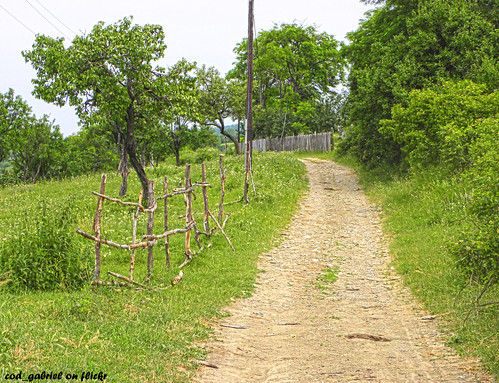 |
| http://www.flickr.com/, photo by cod_gabriel |
Our brains have these old dirt roads in them, too. Those worn roads are called habits. They can be as simple as watching tv before we go to bed, eating eggs for breakfast every morning, or clearing the table before sweeping the floor. When you think a certain way or do something a certain way, it creates a neural pathway in your brain. The more you use that same neural pathway, the more ingrained it becomes, like a worn dirt road.
 |
| http://www.flickr.com/, photo by nevolution |
This is why breaking habits can be so challenging. It's like trying to drive down that dirt road without putting your tires in the ruts, or starting a completely new dirt road instead of using the worn, comfortable one. It isn't easy, but if you keep going down that new neural pathway, eventually, it will become comfortable and worn, and the old one will get grown over and bumpy, so to speak.
These neural pathways apply to your tastebuds as well. Now, I do believe that sugar addiction is one of the reasons we crave foods with refined sugars and flours in them, but alongside of breaking sugar addictions, we can actually change our habits by using new neural pathways.
If you're one of those people (like me) who thinks that one more day won't matter, that one more candy bar won't make that big of a difference, remember the worn dirt road. Each day you put off changing your habits only makes that rut deeper.
Forging a new neural pathway won't feel natural or easy, but each time you use that neural pathway, it will get better. I won't bore you with all of the examples of ways that I've seen my family's neural pathways altered, but I will say that I've seen it most significantly happen in regards to food. My picky eaters initially ate new things grudgingly because they were hungry and there weren't any other options, then, as I continued to offer these new, different foods, they became accustomed to them and have actually developed a taste for things that have really surprised me. The other day, I overheard my son telling a friend of his how delicious carrots are. Seriously? My kid? The one who refused any and all vegetables just a year ago?
Okay, I can't resist. One other example. (Sorry!) My absolute favorite snack in the world has always been those Reese's peanut butter eggs that show up every Easter. I could down an entire package of them all by myself and not even blink. I loved those things! I haven't had one now in over a year, and honestly, when I walk by them in the store, I'm not even tempted to buy them. Of course, if you unwrapped one and handed it to me, I would probably eat it (let's be realistic here!), but if I start craving a delicious snack these days, that's not what enters my mind. I honestly want to make myself a smoothie, munch on an almond power bar, or bake some healthy cookies. I'm not just saying this because I should--I really do crave different things. I've embarked on some different neural pathways, and they've gotten sufficiently worn in.
Yes, your tastebuds can change, and they will change, if you give them time. You might be surprised at how little you crave your old, unhealthy snacks after awhile, and how new, healthier cravings will replace them.
No comments:
Post a Comment